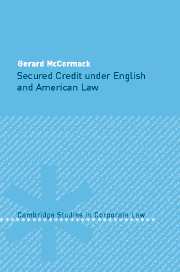Book contents
- Frontmatter
- Contents
- Preface
- List of abbreviations
- 1 The essence and importance of security
- 2 Security rights under English law
- 3 An overview of Article 9 of the Uniform Commercial Code
- 4 Implications of Article 9-type reforms for the English law of security interests
- 5 Notice filing versus transaction filing
- 6 Retention-of-title clauses under English law and Article 9
- 7 Receivables financing
- 8 Security interests in deposit accounts, investment property and insurance policies
- Appendix: Article 9 of the Uniform Commercial Code
- Index
4 - Implications of Article 9-type reforms for the English law of security interests
Published online by Cambridge University Press: 23 July 2009
- Frontmatter
- Contents
- Preface
- List of abbreviations
- 1 The essence and importance of security
- 2 Security rights under English law
- 3 An overview of Article 9 of the Uniform Commercial Code
- 4 Implications of Article 9-type reforms for the English law of security interests
- 5 Notice filing versus transaction filing
- 6 Retention-of-title clauses under English law and Article 9
- 7 Receivables financing
- 8 Security interests in deposit accounts, investment property and insurance policies
- Appendix: Article 9 of the Uniform Commercial Code
- Index
Summary
There would be both advantages and disadvantages in the transformation to an Article 9-type regime as far as current English law is concerned. This is a somewhat obvious point. In the previous chapter three advantages were identified as being firstly the end of compartmentalisation, or at least the beginning of the end of compartmentalisation; secondly, removal of complexities; and thirdly, simpler and more rationally based priority rules. To this could be added a fourth: the greater convenience and flexibility of notice filing over transaction filing. Two other factors might also be mentioned, i.e. clarification of the position of purchasers of charged property and also abolition of the floating charge, with the latter being seen as a possible source of confusion and obfuscation.
The Law Commission consultation paper on Registration of Security Interests highlighted the various deficiencies in English law and particularly emphasised the failings in the current registration of company charges regime. Nevertheless, there would be losers in a straightforward move to an Article 9 system. The Law Commission proposals were framed in such a way as to minimise the impact on groups such as preferential creditors that might otherwise be prejudicially affected by the changeover. The proposals, however, generate their own complications, in particular by the retention of the floating charge that does not feature under Article 9.
- Type
- Chapter
- Information
- Secured Credit under English and American Law , pp. 99 - 128Publisher: Cambridge University PressPrint publication year: 2004



